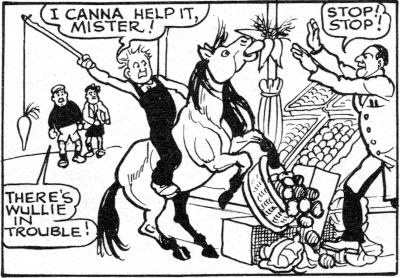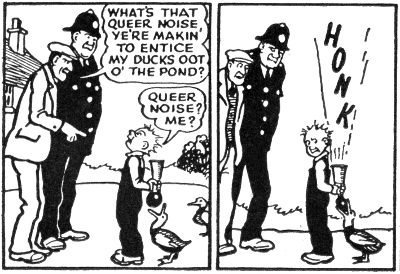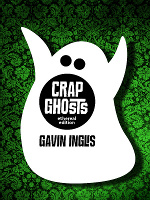Blog
Influences: Oor Wullie
30th December 2014
Dungarees, tackety boots, and comedy fundamentals.In a book sale this year I found some classic collections of Oor Wullie. These normally attract collectors’ prices but in this case were cheap, perhaps because the pages were falling out and several had been coloured in by some Falkirk child of times past. And not by carefully selecting an appropriate colour and filling the area between the lines either — said child had simply picked a page and scrubbed with a purple crayon until becoming bored and selecting a page from the next book.

Oor Wullie will have featured in most Scottish childhoods. This comic appears weekly in the Sunday Post, a gentle tabloid still published by Dundee’s D.C. Thompson. I recommend the paper on a Sunday morning when you are feeling particularly delicate, and need to be insulated from any actual news. On the other hand, if you need one extra ball of wool in a discontinued shade, its readers’ page is a better bet than eBay.
As you grow up, you naturally gravitate to the more adult concerns of its sister strip, The Broons, an unfeasibly large family of comedic archetypes who still live together and are regularly flummoxed by the antics of their spry grandfather. But as a boy I was concerned with the adventures of Oor Wullie. (That’s “Our William” in English.)
Wullie is a mop-headed youth who has some strange preferences: he only likes to wear black dungarees and always sits on a bucket to philosophise. He is often in trouble with his parents, teachers or even the law, but he is not a bad lad at heart; just prone to unfortunate coincidences or thoughtless accidents. In a typical Oor Wullie story, he refuses to play draughts with his cousin Agnes, but opts to explore an old warehouse, ripping his dungarees on the broken window. Patched up, he returns to do daring leaps onto a mattress, but overshoots and lands in a basin of oil. Cleaned up, he returns to play headers in the street but clobbers his skull against a lamppost. Finally listening to his long-suffering mother, he plays draughts with floppy-bow-haired Agnes — who promptly punches him in the face for cheating.
The rhythms of Oor Wullie were good source material for structuring the comedy that I now write. PC McMurdo from Neighbourhood Necromancer is a harder version of Wullie’s benevolent nemesis PC Murdoch. Telling a self-contained funny story in a single page, and doing it week after week — the classic writer/artist team R.D. Low and Dudley D. Watkins did both strips in addition to other work — is not as easy as it might seem.

But what caught my imagination were the bizarre adventures that Wullie has in what is a very ordinary wee Scottish town. Asked by three separate people to deliver a goldfish bowl, a large aerial and a giant promotional teacup and saucer, he ends up winning a fancy dress competition as a “flying saucer man”.
Wullie is not particularly concerned with material things, beyond the latest issue of his favoured comics (coincidentally also published by D.C. Thompson) and perhaps the odd apple or bag of sweets. When his best pal Fat Bob lords it over him with his new pedal car, Wullie constructs his own from an upturned bath. It appears self-powered until the top comes off and he is revealed to have been exercising somebody else's dog all this time, no doubt for a 10p tip at the end.

He is also fond of repurposing objects. When he inherits PC Murdoch’s bearskin hat, he uses it to assist a lady with her shopping, catch a plummeting pot plant and replace a horse’s leaking nosebag. When forced to learn violin, he uses it to swat back divots hurled by a rival gang, and as a bow to shoot sticks. A builder’s hod saves a large gentleman from falling down a manhole, keeps mince away from hungry dogs, traps a rabbit and provides an impromptu elevated chair at the football match. His beloved bucket serves as many things: central heating, armour, lampshade and a watering device for lettuce.
Wullie’s world is one of simple problems and mishaps which are generally resolved by the end of the page. But I still enjoy the imaginative scrapes he gets into with everyday things, and I now recognise these as the foundation for much of my sense of humour.
